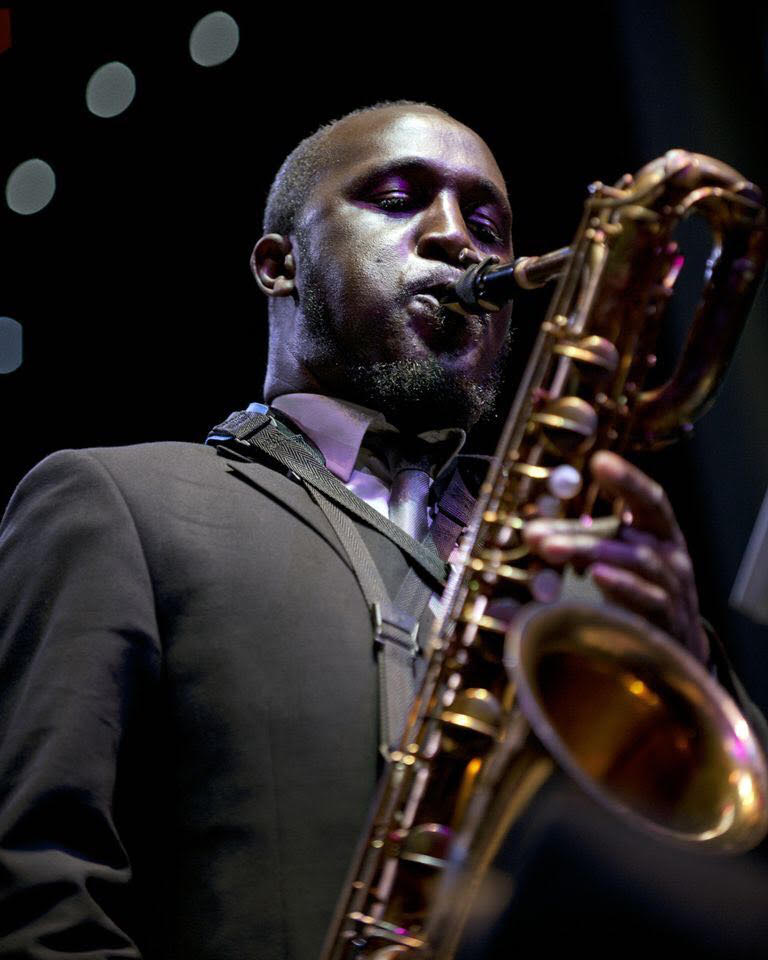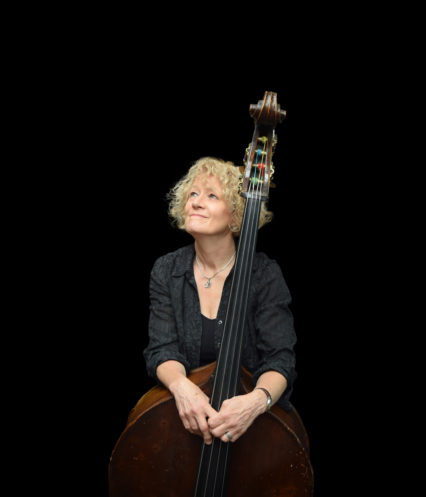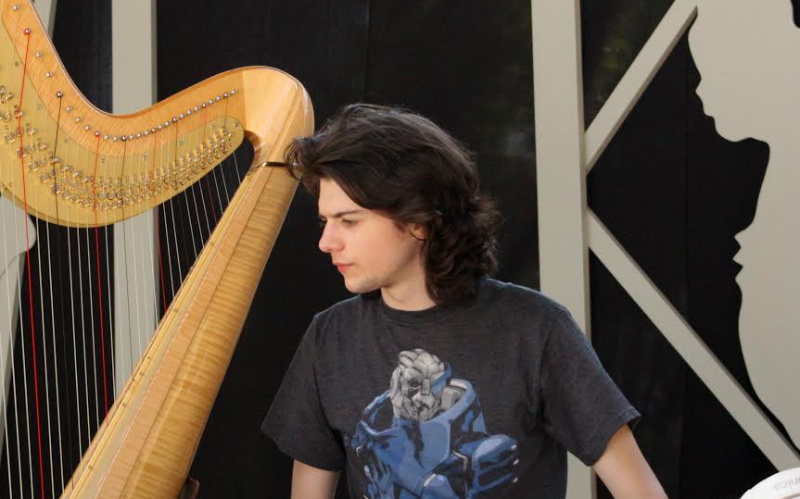There’s a sense in which the current Brecon Jazz Festival and Black Mountain Jazz’s Wall2Wall festival at Abergavenny are remnants of Brecon Jazz, the annual international bash which wound up a few years ago after failing to live up to the risk-taking financial investments of previous years, which, most would agree, were extravagant and always heading for some kind of crash. What they really represent is the continuing local interest in jazz which had much to do with why Brecon Jazz was inaugurated in the Beacons area in the first place.
This was the 11th Wall2Wall festival and the third to take place at BMJ’s new home at the Melville Theatre in the town and, on the final day, at the cavernous Market Hall. It’s only a little theatre and part of what is now a volunteer-run community arts centre, formerly the King Henry V111 Grammar School. But several visiting musicians have affirmed how intimate and sound-friendly is its performing space. This was even true at the final gig this year, when a capacity house turned up to hear baritone saxophonist Tony Kofi and his band, The Organisation. The day before they’d released their album Point Blank, from which they proceeded to play selections. So, their Abergavenny audience was the first to hear it in public. The festival’s upright piano was finally laid to rest by Kofi’s piano-less quartet. Kofi led the charges, relatively unusual for a band playing in a hardi-ish bop manner and relying on a single horn, however stentorian, to make the formal theme statements, though its combination with guitarist Simon Fernsby led to an interesting change of colour.
Toni Kofi
That piano had been fully exploited by some fearsome keyboard talents, including Roland Perrin in vocalist Rachel Sutton’s quartet, Steve Lodder in bassist Alison Rayner’s quintet, and the piano man’s piano man, Dale Storr, who had it all to himself in an opening he called Sounds of New Orleans. Most UK jazz fans’ interest in early jazz of the Crescent City is often synonymous with traditional or ‘revival’ jazz, as it was known in the US and more enthusiastically in Britain and Europe. Although immersed in the New Orleans piano-songster tradition of Dr John, Mac Rebennack, Allen Toussaint, and Henry Byrd (‘Professor Longhair’), he made a special plea this time for a tortured genius named James Booker, whose famous recording of Jimmy McHugh’s On The Sunny Side Of The Street was among the brightest in a parade of highlights that also included Dr John’s Dorothy and Such A Night. Now a Sheffielder, Storr reminded us that London Airport was the place where ‘Champion’ Jack Dupree was first called ‘Sir’, a respect he’d never known in his own country and which he repaid by making his home in Yorkshire. Storr’s is authentic barrelhouse pianism and singing, and should be on the play list of all broad-minded jazz lovers.
Alison Reyner. Image C Reid.
Lodder gives harmonic variety to Rayner’s tightly-structured compositions The quintet (Rayner, guitarist Deirdre Cartwright, Lodder, drummer Buster Birch, and saxophonist Diane McLoughlin) is a focused ensemble whose individuals not so much perform stock solos in the conventional mode but play with each other in mind during Rayner’s highly original and always ambitious compositions. Cartwright and Rayner founded Blow The Fuse Music, and the quintet’s latest recording, A Magic Life, was the source of a few of the numbers here, including the title track; The Trunk Call, a hymn of praise to the elephant, with Asian sounds simulated; and Lodder’s The OK Chorale.
Colin Goode was the pianist in trumpeter Enrico Tomasso’s band, dedicated on this occasion to identifying some of the harbingers of so-called ‘modern’ jazz, a term long superseded by post-modern jazz and everything that’s happened since and is happening now. The show, entitled Swing Till You Bop, was based on the late 1930s and early 1940s, as Charlie Parker and Dizzy Gillespie were shaping up to turn jazz inside out, something cleverly illustrated by Tomasso on tunes such as Coleman Hawkins’s Bean Soup (‘Bean’ was Hawkins’s nickname), which is based on the chord changes of the more familiar Tea For Two. The same technique was used by Parker in Scrapple from the Apple, based on the changes of Honeysuckle Rose. Tomasso acknowledged the signal work of others, such as John Kirby, Charlie Shavers (Undecided), Ellington, and Fats Waller (Jitterbug Waltz) as the stirrings of something new. Goode’s extended piano solo of Earl Hines’s Blues In Thirds was a delight, especially when taken a little quicker than Hines often played it. Among other attractions were Tomasso’s brief lecture on trumpet mutes and Rod Brown’s hands-on drumming on That’s A Plenty.
Frenetic jazz violin was illustrated by the Ben Holder Quintet. Holder’s wind-milling presentation and banter one either liked as a refreshing change of hated as a total distraction. But the boy could play, often too fast but also (and not often enough) in a toned down and decelerated manner for some tunes associated with the so-called ‘gypsy jazz’ of Django Reinhardt and Stephane Grappelli, for which his guitarist, Jez Cook, switched from electric to a Maccaferri-style instrument beloved of Django and the other guitarists in his chamber groups. On another occasion, Holder dashed over to the piano, confessing a love of jazz (he’s classically-trained as a fiddler) and the likes of Oscar Peterson, and an oblique remark, which no-one took seriously, about jazz violin. He played and sang a version of Georgia on My Mind that somehow left the audience nonplussed as to where he was actually coming from. But in a jazz milieu where too many musicians taken themselves too seriously his sense of fun running riot raised smiles.
Ben Creighton-Griffiths
Intermissions were held in the theatre bar, where jazz harpist Ben Creighton-Griffiths was first off, upholding the instrument as not so much one that takes naturally to jazz but which can give jazz an ethereal twist. His task, it seems to some, is to rid the exercise of its novelty value. That he has a jazzman’s sensibility is undeniable. The highly-regarded Swansea pianist Dave Jones set off on a marathon of hour-long interval accompaniments at the keyboard on Saturday, though he wouldn’t call them that, nor should he, considering the part he played in making good musicians sound even better in duo format. Debs Hancock’s vocals – Blue Skies, Don’t Explain, and Spring Can Really Hang You Up The Most, the last ever associated with Ella Fitzgerald – displayed a great feeling for changes of mood. In his exquisite duo with bassist Ashley John Long, Jones was extending an association already preserved on disc. Then there was saxophonist Glen Manby, and trumpeter Ceri Williams, making a welcome return to the club. Jones and the rest represented the glittering arena that is Welsh jazz, with Long also forming part of the Daniel Newberry Quintet. Its pianist, Guy Shotton, is a graduate of Cardiff University’s music department, and the band also included drummer James Sherwood. That a few of these confident musicians have yet to fix their career directions was perhaps illustrated by trumpeter Thom Voyce’s songs – among them There Will Never Be Another You and Smoke Rings – and his doubling of flugelhorn, which was there if he needed it. These were all musicians climbing the learning curve and keeping all options open.
Rachel Sutton outdid every other singer on show, perhaps as the embodiment of jazz’s distaff feistiness, these days ever more pertinent as the latest wave of feminism makes men think again about their attitudes – especially the narrator of a song performed by Tomasso entitled Ain’t The Gravy Good, ever associated with the trumpeter and sometime Duke Ellington sideman Cootie Williams. It’s a put-down of woman as domestic failure in all but a microscopic corner of the kitchen. That it seemed slightly embarrassing now connoted the kind of victory Sutton might celebrate in songs interpreted winningly, as if by the woman refusing to be vanquished. They included There’ll Be Some Changes Made, I Don’t Stand a Ghost Of A Chance With You, and Love For Sale. Sutton, a trained and professional actor, brought depth of character to these songs, a quality she most certainly has the ability to extend.
The festival began with a formal dinner that acknowledged the huge part played in the existence and continuation of the event by Alun Griffiths’s civil engineering company, based in the town. Music, mostly jazz standards was provided in two sets by vocalist Becki Biggins and her quartet, in which Shotton made his first festival appearance. Biggins is guaranteed to turn a formal occasion into the beginnings of an informal party. The festival ended in the Market Hall, with free entry to its popular Jazz Alley, with music by Wonderbrass, Tarion and Rebelinx, a US band ending their UK tour in Abergavenny. On the final Sunday evening, a charity swing party in aid of Ty Hafan’s work in music therapy featured The Electric Swing Circus. Each year it’s Wall2Wall’s way of extending the festival to those who might, just might, imbibe the music sufficiently to give the festival a go the following year. For surely it will be back.


